Origine: Galassia Internet, p. 211
Manuel Castells frasi celebri
Origine: Galassia Internet, p. 262
Origine: Da I liberisti brasiliani scendono in piazza, Internazionale, n. 1096, 3/9 aprile 2015, p. 40
p. 40
Manuel Castells: Frasi in inglese
Origine: The Internet Galaxy - Reflections on the Internet, Business, and Society (2001), Chapter 5, Computer Networks and Civil Society, p. 142
Origine: The Rise of the Network Society, 1996, p. 390 as cited in: Jari Peltola (2006)
Origine: The Urban Question: A Marxist Approach, 1977, p. 216
Origine: The Internet Galaxy - Reflections on the Internet, Business, and Society (2001), Chapter 1, Lessons from the History of the Internet, p. 22
Origine: The Internet Galaxy - Reflections on the Internet, Business, and Society (2001), Chapter 3, e-Business and the New Economy, p. 92
Origine: Materials for an exploratory theory of the network society (2000), p. 13
Origine: The Internet Galaxy - Reflections on the Internet, Business, and Society (2001), Chapter 3, e-Business and the New Economy, p. 112
Origine: Materials for an exploratory theory of the network society (2000), p. 5
Materials for an exploratory theory of the network society (2000)
Origine: The Rise of the Network Society, 1996, p. 211 as cited in: Jari Peltola (2006) " The Place of Politics in Manuel Castells’s Network Society http://www.edemocracy.uta.fi/eng/haefile.php?f=115"
Origine: The Internet Galaxy - Reflections on the Internet, Business, and Society (2001), Chapter 1, Lessons from the History of the Internet, p. 22
Origine: The Internet Galaxy - Reflections on the Internet, Business, and Society (2001), Chapter 9, The Digital Divide in a Global Perspective, p. 269
Origine: The Urban Question: A Marxist Approach, 1977, p. 276)
Origine: Urban renewal and social conflict in Paris, 1972, p. 93
Origine: The Internet Galaxy - Reflections on the Internet, Business, and Society (2001), Chapter 2, The Culture of the Internet, p. 48
“The Internet is, above all else, a cultural creation.”
Origine: The Internet Galaxy - Reflections on the Internet, Business, and Society (2001), Chapter 1, Lessons from the History of the Internet, p. 33
Origine: The Rise of the Network Society, 1996, p. 433–434 as quoted in: Wayne Hope (2006) Global Capitalism and the Critique of Real Time http://www.sagepub.com/dicken6/Sociology%20Online%20readings/CH%202%20-%20HOPE.pdf. Sage publications. p. 289
“The Internet Culture is the culture of the creators of the Internet.”
Origine: The Internet Galaxy - Reflections on the Internet, Business, and Society (2001), Chapter 2, The Culture of the Internet, p. 36
Origine: Urban renewal and social conflict in Paris, 1972, p. 93-94
Origine: City, Class and Power, 1978, p. 177–178 as cited in: McDowell, Ward, Fagan, Perrons and Ray (2006) "Connecting Time and Space: The Significance of Transformations in Women’s Work in the City". In: International Journal of Urban and Regional Research. Vol 30.1 p. 141–158
Origine: The Internet Galaxy - Reflections on the Internet, Business, and Society (2001), Conclusion, The Challenges of the Network Society, p. 275
The Rise of the Network Society, 1996
Origine: The Internet Galaxy - Reflections on the Internet, Business, and Society (2001), Chapter 3, e-Business and the New Economy, p. 91
“Societies change through conflict and are managed by politics.”
Origine: The Internet Galaxy - Reflections on the Internet, Business, and Society (2001), Chapter 5, Computer Networks and Civil Society, p. 137
Origine: The Internet Galaxy - Reflections on the Internet, Business, and Society (2001), Chapter 3, e-Business and the New Economy, p. 90
Origine: Urban renewal and social conflict in Paris, 1972, p. 93
Origine: The Internet Galaxy - Reflections on the Internet, Business, and Society (2001), Chapter 2, The Culture of the Internet, p. 36
Origine: The Internet Galaxy - Reflections on the Internet, Business, and Society (2001), Chapter 1, Lessons from the History of the Internet, p. 10
